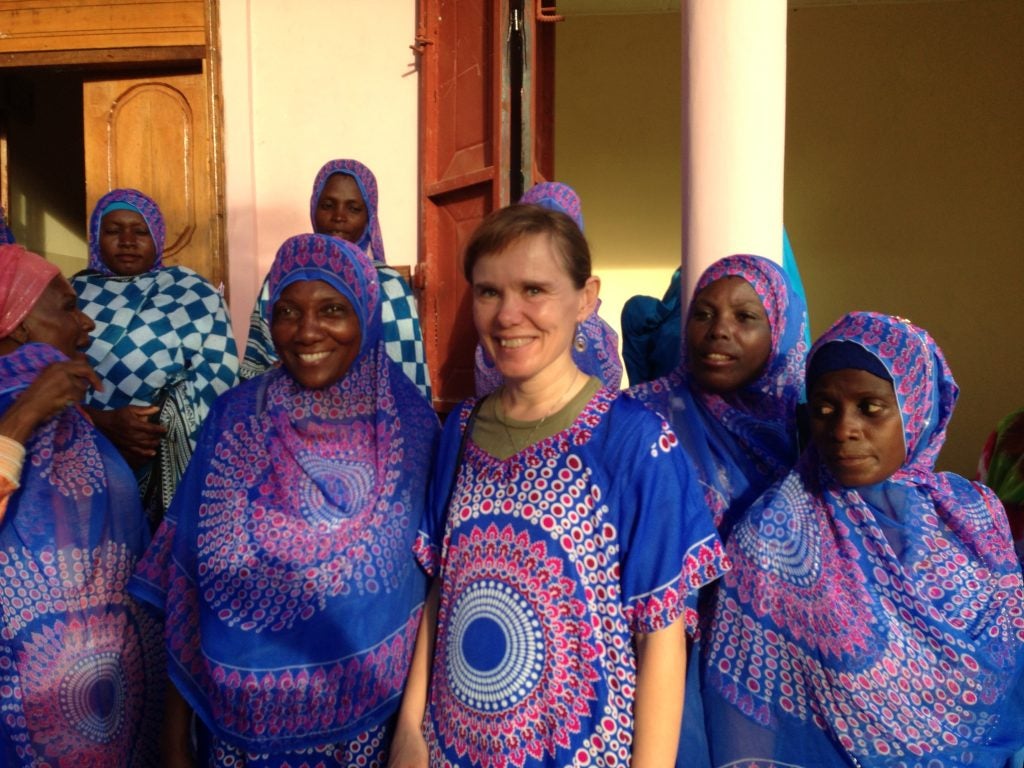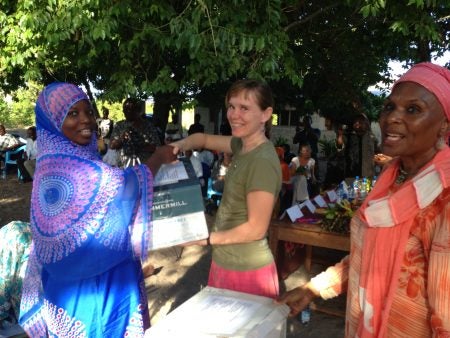 Elin Torell first heard about women in Tanzania exchanging their bodies for a supply of fish when she was researching small fisheries in East Africa. It’s called “sex for fish,” or, in some countries, “jaboya.”
Elin Torell first heard about women in Tanzania exchanging their bodies for a supply of fish when she was researching small fisheries in East Africa. It’s called “sex for fish,” or, in some countries, “jaboya.”
“Women would go to the boats to buy fish, and the fishermen would demand sex before selling any fish,” says Torell. “It’s a kind of blackmail. That was a real eye-opener for me.”
More often than not, the women complied because they had no choice: Cleaning the fish and then selling them in the market was their only source of income.
As an environmental researcher at the University of Rhode Island and an international expert on gender roles in small-scale fisheries, Torell is determined to stop that abusive practice and other behaviors that demean women working in fisheries in East and West Africa.
The world is taking notice. Torell recently received a Woman of Achievement Award from the YWCA of Rhode Island for her groundbreaking work, joining 10 other local women for their accomplishments in industry, culture and public service. Director of International Programs for the Coastal Resources Center at the Graduate School of Oceanography, Torell was singled out for her gender equity research on the African continent.
“I was thrilled with the honor,” said the 47-year-old South Kingstown resident and mother of three. “It validates more than two decades of work researching how women can take on a greater role in fisheries management throughout the world.”
Born in Gothenburg, Sweden, Torell credits her uncle, a fisheries expert based in Bangkok, with nurturing her passion for the ocean and coastal issues. After studying aquaculture development in Vietnam for her master’s degree at the University of Gothenburg, she landed at the Coastal Resources Center on URI’s Bay Campus for a fellowship, intending to stay one year. That visit turned into 20 years. Along the way, she earned her Ph.D. in environmental studies from Antioch University and discovered her life’s purpose.
She took her first trip to Tanzania in 1998 to study local fisheries, and soon realized that entrenched and oppressive social systems were holding women back. “I saw a need to address the broader issues—health, family planning, gender and jobs,” she said. “To me, it was the right thing to do. You have to take a holistic approach to bring about change, otherwise you’re not going to succeed in your conservation efforts.”
Funded by grants from the United States Agency for International Development and private foundations, Torell has visited countries in East and West Africa at least 100 times in the last two decades, working with governments and nonprofit organizations to better the economic and social lives of women and their families.
 In Tanzania and Ghana, she improved women’s access to savings and credit. Women in small coastal communities have trouble getting credit for entrepreneurial ventures. Their sources of credit are money lenders and traders who charge excessively high interest rates. Torell established savings and credit cooperatives to help women start businesses involving fish processing, seaweed farming, beekeeping, baking and restaurants.
In Tanzania and Ghana, she improved women’s access to savings and credit. Women in small coastal communities have trouble getting credit for entrepreneurial ventures. Their sources of credit are money lenders and traders who charge excessively high interest rates. Torell established savings and credit cooperatives to help women start businesses involving fish processing, seaweed farming, beekeeping, baking and restaurants.
Also in Tanzania, Torell strengthened the roles of women and other vulnerable groups, including orphans and people living with HIV/AIDS. At public events, she talked about how to protect girls from early and forced marriages, rape, domestic violence, early pregnancy, and even sex-for-fish encounters. She also worked to prevent HIV/AIDS by encouraging condom use, and she recruited residents to provide better access to family planning.
In Tanzania, Ghana and the Gambia, Torell inspired more women to get involved in fisheries management. Women earn money from oysters and other bivalves living among mangroves along the shore. The oysters are an important source of protein and food, but the management of these resources is typically not part of fisheries management. The areas are called “silent fisheries” because they are off the radar of local fisheries managers.
Torell helped women gain access rights to these fishing regions so they could preserve them for future generations. She also trained women how to increase their income by improving the value of the oysters they collected. In Tanzania, for example, she supported pearl farming and jewelry making from discarded oyster shells.
“It’s hard to make change but when it happens it’s incredibly rewarding,” she said. “And that’s why I do the work. I’m always moved when I see women gain more self-esteem through good work and become leaders in their communities. Those women, in turn, inspire and reveal to other women that there are options in life.”
Torell will return to Malawi in southeastern Africa in the spring to do a follow-up study on a Coastal Resources Center program to improve the local fishing economy. She will also turn her attention to another part of the world that could use guidance on gender equity issues in fisheries management: Central America, specifically, Nicaragua, Honduras, El Salvador and Guatemala.
“This is a new continent for me, and I’m very excited about the possibilities,” Torell said. “We’re eager to continue to make life better for people throughout the world.”
Photo captions: Top — Elin Torell, director of international programs for the URI Coastal Resources Center, with women in Zanzibar celebrating the opening of a savings and credit cooperative. Photo courtesy Elin Torell. Bottom — Torell provides donated jewelry-making tools and beads to women in Tanzania. Photo courtesy Elin Torell.
Media Contact:
Elizabeth Rau
401-874-2116
